Recommended to students of history, international relations, presidents, and biographies. As to the latter, this volume is an exemplar.
Woodrow Wilson was articulate, precise, committed, strong, and strove for a higher purpose than the next opinion poll. He owed nothing to anyone in politics, having entered as a clean-skin with no baggage. But he expected blind loyalty from those around him, not because they owed anything to him but because he was right! He was also one-eyed, a racist, a self-made martyr, and careless of others.
Only stereotypes are consistent and simple.
After the generations of political corruption following 1865, first Populism and then Progressive aroused the electorate. That tide lifted Wilson, first to governor of perhaps the most corrupt state of New Jersey in 1910, and then to the Democratic presidential nomination in 1912. Thanks to Teddy Roosevelt’s third party, the Republican vote was split and Wilson won. Equally, though, one might think TR split Wilson’s progressive vote. Think of Clinton, Bush adult, and Perot in 1992.
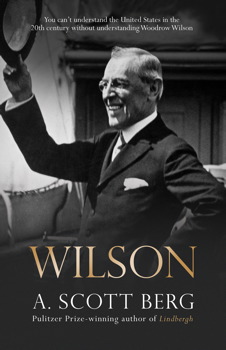
Wilson resisted the pressure to join the European war, until German unrestricted submarine warfare aroused public opinion, thanks to the irresponsible journalism of the Murdoch press, oops, the Hearst press, and his own ire. The latter was probably the more decisive of the two to Wilson. But he believed what he said, the United States entered the war to fight for a principle, unlike all the other combatants who were fighting for territory and survival, by the way that principle was the freedom of the seas. This is a foundation stone in the mystique of American Exceptionalism.
The war and the peace that followed forever defined Wilson’s administration, but before getting to that a few other things should be noted. He initiated several enduring practices: the news conference with journalists, presidential addresses to Congress, and the income tax. He appointed Louis Brandies to the Supreme Court who changed American jurisprudence. He allowed his son-in-law racially to segregate the Treasury Department which had previously been integrated in a small way. He supported female suffrage but did not think it should take the form of a constitutional amendment, though he did relent on that. He vetoed Prohibition on the same grounds.
But most of all there was first the war and then the peace. The Western Allies were in dire straits when the United States entered the war. Yet Wilson insisted that American troops would only enter into combat when they were trained and then as a unit, not as piecemeal replacements to be used by English and French commanders as cannon fodder. This insistence, made face-to-face by the United States commander Jack Pershing, led the Allies to form a single, consolidated command, after three years of unco-ordinated slaughter. That in itself was a strategic accomplishment.
Against the even more depleted Germans, when the United States Army did enter combat, fully trained and superbly equipped, it had successes that vindicated Wilson’s insistence in his own mind. He was, as usual, right.
The Peace Conference was a circus like never before. Because Wilson promised the American farm boys he sent to France to die and to become blind, diseased, paraplegic, or to suffer a long painful lingering death from mustard gas in a hospital in Ohio in 1920 that this war would be the last one, in making the peace he strove to uphold his part of that pledge.
The Fourteen Points he made the basis of American entry to the war promised to re-draw the map of most of the world, and so most of the world descended on Paris to insist that the Little Enders were the Devil’s Spawn and we Big Enders can never abide them.
Meanwhile, France in the person of Georges Clemenceau, proudly bearing the nickname ‘Tiger,’ insisted on emasculating Germany. Wilson wanted a simple treaty ending the war, and a permanent world body — the League of Nations — subsequently to work out all the details of implementing the Fourteen Points. France wanted a detailed treaty that would forever eliminate Germany as a threat to France, and finally only agreed to the League of Nations to secure American loans to rebuild Eastern France. To get the League Wilson gave way on French demands, though Wilson said at the time that these demands, unchecked, would lead to another war. Right again.
Then Wilson had to sell the League of Nations to two-thirds of the United States Senate. Opponents in the Senate thought it would embroil the United States thereafter in European politics.
In the midst of this struggle with the Senate, Wilson had a stroke and become a virtual recluse for the last years of his second term. His wife, Edith, hid his incapacity (with connivance of his physician) even from cabinet, and in time he partly recovered. Ever a small-town, many in Washington at the time referred to President Edith since she determined who saw him for many months. The petitioner would leave the matter Edith who would decide whether to show it to Wilson and, if so, she would often edit it to a few sentences. Most petitions went unanswered. In the hiatus postmasters were not appointed, zoos were closed, soldiers remained in Europe, medicine was not distributed in response to the Spanish Flu, goods piled up at ports not cleared by Customs, passenger ships could not off load travellers in harbors because Immigration officials were understaffed… Concealing his disability was unconstitutional, illegal, unethical, and probably immoral. She did it as therapy for Wilson. He had to believe he was still president to recover. Love makes us do things we would never do for ourselves. (On President Edith see Gene Smith, When the Cheering Stopped [1964]).
To this reader, Wilson was not on the job for several long periods. When Ellen died he went into a numbed shock. When he courted Edith, he could only think of her, working it the White House only an hour or two a day. He spent six month at the Paris peace talks. He was fully and partly incapacitated for six months. His two month speaking tour for the League in 1918 took him out of the White House. All of that adds up to about two years when his mind was not on the day-to-day work of the executive.
By the way, Edith attended Jack Kennedy’s inauguration in 1961 shortly before her death.
Wilson retired and then had to make a living since there was no presidential pension. He tried law but he would not take a case involving a client he disapproved of, this did not work since he disapproved of almost anyone capable of paying his fee. In the end private charity from supporters bought the Wilsons a house and an annuity.
There is a lot more to the story, but these are some of the highlights. My notes on this presidential biography run to 4,000 words. This review is an abridgement of that verbiage. The book is scrupulous about evidence and the judgements Berg offers are carefully circumscribed and limited. Altogether a book to recommend. I did think the Zimmerman Telegram got short shrift.
Category: Book Review
Gail Bowen, Murder at the Mendel (1991)
Recommended with qualifications as below.
It has an exotic setting, Saskatoon, Saskatchewan, Canada. The Canadian Prairies in January and February no less. Dry frozen.

The protagonist is a part-lecturer at the University of Saskatchewan who seems to find plenty of trouble and whose work at the University does not seem to figure largely in her day. Might be the University of Sydney that. She is a widow with two adolescent children. But we do not get bogged down in domesticity.
The good: the provincial art world is a good context, there is none of the padded descriptions I find in many alleged krimies, the characters are differentiated though not always credible (like Nina the villain). For the most part the weather is presented realistically. Sally, the artist, is well drawn, way too smart and a very charming and talented user, but first last and always a user of other people. She reminded of some people I have known.
At one point a character says: ‘In art men look for statements and women look for relations.’ Nice.
The bad: it takes 60 pages of background to get going and the reader has no clue about why to read this and what to take from it. Yes some relevant things from this opening stretch are there at the end but not 60 pages worth. While the weather is there, it does not stop people from hanging clothes on the line and our protagonist gets by for a month without a car which is impossible in such a city because there is no public transport to speak of and few taxis. I also found the dirty secret not to be so dirty though perhaps in Saskatchewan it would be hard to live down. Stuart is also less than believable and after centring on him he then disappears toward the end. A blue herring. The fresco of penises was adolescent.
William Ryan, The Holy Thief (2010)
Recommended for Krimieologists (readers of crime novels). Set in the Soviet Union of 1936.
A lot of period details are easily integrated into the plot. Though it reads like ‘Nineteen Eighty-Four.’ I don’t know whether that is because ‘Nineteen Eight-Four’ was very accurate to the Soviet Union or because the author has been influenced by it and so ‘Nineteen Eighty-Four’ has shaped the telling, or is it that I am superimposing ‘Nineteen Eighty-Four’ onto it?

Korolov, the protagonist, is a loyal Soviet citizen yet he remains a believer (religious in secret) so there is a gap in his commitment to communism. 1936 is a tough year. Food is scarce, the rhetoric of paranoia is high, the winter is biting in Moscow, the zealots are zealous, and most people are struggling to survive while mouthing the requIred slogans. Only the great helmsman is above suspicion. For everyone else the goal posts constantly change and the marbles underfoot are ever-present. Not for everyone but for those in the police, the army, the party, the government, the collectives, there is a premium on denouncing someone, quotas for subversives to be jailed, disappearances, changes of portraits on the wall signal another wave of purges. But wait, there is more.
The person who is the least suspicious is suspect because a spy would not seem suspicious goes the prevailing logic. That and large measures of guilt by association, objective guilt, nets nearly everyone. No one is safe in this world.
No doubt there are parallels with North Korea today, yet I also thought there are also parallels with the green dream of telling everyone else what to do, when to do it, and how to do it on the grounds of the peril at the gate. Priests do like preaching even to a captive audience. The permanent crisis and the unscrupulousness of many supposed enemies of the Soviet Union requires endless vigilance. What reminded me most of green dreaming was the constant emphasis on the right nomenclature, and the least slip of the tongue, like gasping out ‘oh my God’ in surprise, is evidence of religious backsliding.
Now to the cavils, I thought Korolov got two tickets to the big game but he took four people in all without any trouble. Plus at a time of famine there were meat pies aplenty for sale at the game. Though Jack looked askance at the meat pie we never find out why. For a guy who is hard up Korolov takes a readily available taxi from the game. And he also has money for bribes, for smokes, and for meat pies for four.
This novel compares favorably to Sam Eastland, ‘The Eye of the Red Tsar’ which is set in 1924 in the Soviet Union. For this reader ‘The Holy Thief’ was better. This novel has less clutter, more insights into events, and complexity without confusion. Much less of an overblown backstory for our protagonist to interfere with the momentum. We learn about Korolov through his acts, words, and thoughts, and not by the exposition of a punctuated recitation of a contrived backstory in a curriculum vitae to make him sympathetic.
John Meacham, American Lion: Andrew Jackson in the White House (2009)
Jackson was a man of oscillating moods. Sometimes personable, charming, considerate. Other times raging, violent, bullying. Sometimes humane and broad minded; other times contemptuous, racist regarding negroes and Indians, and provincially narrow. All of these in a single day on occasion.
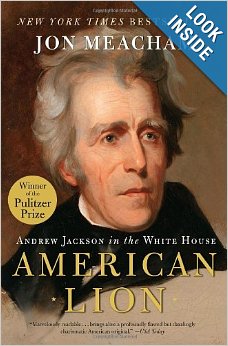
He was at time proudly ignorant yet more well read than many of his friends and any of his enemies knew.
Orphaned when first his father died and then his two older brothers and mother died as result of British military action, during the Revolutionary War. He forever thereafter hated England and suspected it of any and all nefarious actions against the United States.
During his military career he took a paternalistic interest in his soldiers, refusing to leave a single one behind on march, even that meant every officer, himself first, had to walk, giving up their horses to pull wagons and litters. On the other hand he was a tyrant about obedience to the point of execution.
He hated indians beyond reason yet he adopted and raised in his own home an orphaned Indian boy found while his men were massacring a tribe. He wanted to clear indians from the south as they had been cleared from the north, freeing the land for plantations and cotton and thus more slaves. He was an advocate of slavery and completely indifferent to blacks, yet 500 free men of color (in the phrase of the day) were instrumental in his great victory in the Battle of New Orleans, along with about 100 Choctaw indians. But a racist is a racist.
He liked to surround himself with young men, as acolytes, but perhaps also substitutes for the younger brothers he did not have.
He identified himself nearly complete with the country as the family he never knew. Insults to it were insults to him. Insults to him were insults to it in his mind, or so it seemed to some observers.
The mediating institutions created by the constitution stifled the people and supported the privileged, he supposed. He won more votes but had fewer electoral votes than John Quincy Adams in the 1824 elections, throwing the decision to the House of Representatives which promptly (s)elected Adams. The mediating institutions included the Electoral College, the elections of senators by state legislatures, the appointed for life of Supreme Court judges, and the Bank of the United States, which separately and together limited government in the interest of the privileged, he thought, who peopled those mediating institutions. In the 1828 election Jackson won in a four-way race.
The Nullification Crises began in the 1820s and continued for a decade when John C. Calhoun, having resigned as Jackson’s Vice President, argued that South Carolina would choose which federal laws to obey and nullify others. He ever referred to secession. Jackson feared that the state(s) would destroy the union.
At the time Russia in the Pacific Northwest from Alaska to Washington along with the British from Oregon to Quebec in the north, and the Spanish and French in Mexico and the Caribbean surrounded the United States and in his eyes conspired against the continuation of the union. Predators all. Enemies with and without the gates.
The nullification crises was precipitated by an international agreement signed by the Federal Government that permitted seamen to have the freedom of the city while in port. That meant blacks on English, French, Dutch, Portuguese, Spanish, and other merchant ships could walk the streets of Charleston as free men.
South Carolina objected and then overruled this agreement by jailing any black sailors who set foot ashore while their ship was in port! That action breached an international treaty duly ratified by the Senate and signed by the president of the United States.
The South Carolina justification was that free blacks would by example produce unrest in slaves, might foment slave rebellion, assault white women because they have no civilised control, would be used by the English to destabilise and divide the States….. And the sky would also fall.
Jackson had a constant battle with the Bank of the United States to support local improvements, like roads and bridges. What we call today infrastructure loans to states, counties, towns, etc. The Bank had no interest in bridges over rivers in Tennessee or hard roads in Georgia.
The tariff added, it was claimed, 40% to the price of goods consumed in the south and produced in the north behind tariff walls. The tariff gets tied up with states’ rights, along with slavery, as part of the dominance of the union by northern interests. Ergo to a Calhoun, abolition is a smoke screen to dominate the south and keep the tariff, and the Bank.
Then there was the Petticoat War between his niece in-law Emily and the wife of cabinet secretary Talbot. Emily was determined to show Washington DC snobs that she, from the wild frontier of Tennessee, adheres to the highest standards of propriety and so will not receive Mrs. Talbot, who wed Talbot before her divorce from her previous husband was known to her to be concluded. Moreover, Mrs. Talbot came to the Talbot marriage with a dubious reputation. (But nothing worse than had been said about Rachel Jackson.) So Mrs. Talbot was three times over not to be received: bad reputation, divorcee, and bigamist.
Emily was the wife of Andrew Jackson Donelson, who was Jackson confidante and private secretary, and an ersatz son to him. Jackson likewise was a kindly patron to Emily until the Petticoat War became the talk of that small town on the Potomac.
The Little Magician, Martin van Buren, tried several times to broker a peace between the two ladies, but each time Emily either dithered, or agreed and then revoked her agreement.
Meanwhile, Calhoun and Henry Clay are vultures circling, preparing for their own runs for the White House in 1832. John Quincy Adams, who Jackson roundly defeated in 1828 is sulking and very ready to plot Jackson’s downfall. He might help Clay but probably not Calhoun, since Adams is pure New Englander.
While Jackson was ready to send the Federal army to the Blackhawk War in Illinois it was over before Winfield Scott could get there. He started the First Seminole War to move indians out of Georgia and Alabama first into the swamps of Florida and then across the Mississippi. That is why there is a Miami in Ohio.
Jackson rejected Henry Clay’s proposal for national day of prayer during a widespread cholera epidemic to keep the separation of church and state.
When the Nullifiers got agitated Jackson had the entire Federal army garrison in Charleston replaced by true blue union men, and he managed to do this on the quiet.
He campaigned hard for re-election in 1832. That is, he went on the campaign trail, speaking, shaking hands, etc. The first time a candidate had taken his campaign directly to voters. Martin Van Buren was the de facto campaign manager as the Vice-Presidential nominee. Jackson triumphed comprehensively in 1832 over Henry Clay: 54% to 36%. There were two other candidates who made up the rest.
The Compromise of 1832 in part negotiated by the Great Compromiser, Henry Clay, combined the Tariff reduction act with the Force Bill. The tariff was lowered to placate Southern planters and the Force Bill, though redundant, explicitly empowered the president to collect the tariff by force, if necessary. Martin van Buren did much of the politicking in Congress to count the votes.
When all else failed Jackson withdrew Federal government deposits from Bank of the United States and shifted them to banks in states. By distributing the monies he won over allies, by withdrawing the funds, he killed the Bank of the United States and with it, Nicholas Biddle’s own presidential ambitions. He later vetoed the renewal of the charter. The Bank funded Henry Clay’s presidential campaign very handsomely, using tax deposits, but Clay still lost.
Jackson’s second inaugural address emphasized the Union that won our liberty from England, the Union that secured our freedom, the Union dealt with the Indians. The Union that made us prosperous through industry and trade. Union secured our lands. Union….. These goods were achieved by Union, not by this state or that. Now picture the results of disunion. Each state will guard its borders. Each state will impose its own tariffs and taxes. Each state ill built only internal roads. And so on. A pretty well made argument for a man with little credit as a thinker.
There was a point-blank assassination attempt by a nutter. Jackson was convinced it was a conspiracy of his enemies working through this reprobate.
When William Lloyd Garrison sent thousands of copies of an abolitionist tract through the United States mail to Charleston, Jackson sat idly by when South Carolina firebrands burned the warehouse they were in. He did nothing to protect the U.S. Mail and in fact asked about legislation to stop sending such material through the mail.
Jackson viewed Van Buren as his successor and the vote for Van Buren as a vote for him, Jackson, so Jackson worked hard for Van Buren in 1836.
I listened to this book on Audible in an abridgement during 20-minute episodes dog-walking or pedaling at the gym. That makes it harder for me to assess the research basis of the book. But I can say that it is not one-eyed. More than once Jackson’s mistakes and faults are noted. And at the end the author notes how great evil can be the commonly accepted practice of the day, namely slavery.
Phryne Fisher’s alter ego
Another Eleanor Jones krimie set in 1923 Melbourne during a police strike: Carolyn Morwood, Cyanide and Poppies (2012).

Eleanor is now a reviewer for ‘The Argus.’ Nicholas is still there; his wife is not. Andrew has returned from, of all places, Dimboola, but is as fragile as cracked crystal and less stable.
Slow and thoughtful. Eleanor is introspective but it never feels like superfluous padding as it so often does in many of the Chick-Krimies that I sample and reject. Morwood brings Melbourne of the age alive with gravity in contrast, say to Miss Fisher with her bold and brassy and superficial appurtenances like cars, clothes, etc. If Miss Fisher, god love her, is nearly a cartoon, Eleanor is nearly a tragic heroine the 19th Century. They are both treasures.
Eleanor is a very serious person who served as a nurse during World War I in Palestine and France. She has seen much death and more suffering and been unable to do anything much about either. Her fiancée and her older brother were both killed in France, and the younger brother Andrew, who also served in France, returned psyched out. Not much fun there.
Her childhood sweetheart Nicholas is married but his wife seems to be permanently away, perhaps never to return. No one knows, perhaps not even Nicholas. He helped Eleanor get the job at the newspapers and they spend time together wondering no doubt how what might have been or what might be….
Meanwhile the hoons feel licensed by absence of police, most of whom are on strike. Vigilantes organise in turn. Libertarian hoon versus self-righteous thug is the result.
Within this context it is an engrossing study of relationships distorted by the gravity of a murder. The victim is a nosy, unpleasant journalist, who was perhaps given to blackmail. Andrew’s girlfriend, not quite girlfriend but might be, is the suspect. It is Sister Jones to the rescue.
There is much about Eleanor managing Andrew, trying to do it without his awareness. Their rapprochement and cooperation is well done. Inspector Pearce is well meaning and competent but under much pressure because of the Police Strike. The tension between Eleanor and Nicholas Bird is unrelenting. His daughter Kate is instrumental in the denouement, at first reluctantly but then willingly. ‘Reluctantly’ because Kate sees Eleanor as a threat to her absent mother or Kate’s own monopoly of Nicholas. But Kate, too, wants to help the innocent Nadine, Andrew’s deuce girlfriend, so she joins the plot.
There is to’ing and fro’ing in Melbourne and out, namely a train ride to and from Dimboola.
Nice touches, how the same facts can be construed in different ways. I also liked the ambiguity of Nadine’s (the maybe girlfriend) claim to be a medium, though it was dropped completely after being such a big part of the buildup. Some kind of recognition, if not resolution, is needed on that, not just omission. Likewise the unresolved tension with the maid is magnified, and then not mentioned again.
Rachel, Nicholas’s absent wife, writes to ask for a divorce! I foresee much consternation ahead. Divorce might ruin him socially in Melbourne. Kate would react how? Would he then be free for Eleanor or would he be too injured and want to avoid contaminating her?
It was not hard to figure out the villain before Eleanor. The most sanctimonious ones are always at it in krimies, as often in life.
Clock without Hands by Carson McCullers
Recommended for adults.
Another profound examination of life by this blighted soul, Carson McCullers. It opens with Malone, a small town pharmacist, being told he has leukaemia and a year to live. During the novel he reflects on his life, ponders his own death, while meeting his friends and customers. He also discovers somethings about himself, some good and some not.
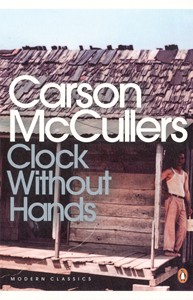
The novel becomes a sustained critique of racism, though the word ‘critique’ is not right. ‘Satire’ might be a better word were the subject not so immediate and serious. In these pages two blacks are killed, each murder involves a law officer, but nothing is done to apprehend the perpetrators. Indeed one is killed by a police officer on the street in daylight.
It is not all grim. The Judge’s breakfast is told as an act of loving tenderness. That man loves to eat and is digging his own grave with his teeth, as he says. He has a cracked-brain plan to revive his political career by proposing that the hated Federal Government (Dwight Eisenhower was president at the time) convert Confederate dollars into coin of the realm. His grandson Jester, whom the widowed Judge loves beyond word, rejects this along with the Judge’s ingrained white supremacist attitude and by chance seeks out the company of a black man who is unreliable and suspicious, and yet there is some rapport between them that each recognizes and neither understands.
The Judge’s wife died years ago, and his son committed suicide quite a time ago, too, and that hangs over the Judge and all who mix with him.
Malone goes through the five stages of grief for himself, denial and isolation, anger, bargaining, depression, and acceptance. But Malone does not figure in the middle of the story.
There the principals are Judge Fox Clane, his dead son John Clane whom we meet in retrospect, his grandson Jester, and the black Sherman Pew. John Clane, though married came to love another woman who in turn had a sexual liaison with a black man which produced Sherman. John Clane defended this black lover when accused of the murder of the estranged husband of this other woman, and John Clane lost and so did his client. Then the woman rejected him and so he took his own life, twice over a failure. This is revealed piece-by-piece in the middle of the novel. The Judge knows all and indeed he presided at the trial where his son defended the hopeless cause. That may seem strange to law students, but reality is a lot more confused than textbooks.
Judge Fox Clane is portrayed as a nearly perfect fool. When Jester, Sherman, or others ridicule him, he genuinely thinks it is praise, etc. He even confides his plan to cash in Confederate dollars and almost proposes a return to slavery to the black Sherman Pew and then is puzzled when he – Sherman – gets mad. The Judge is not clever like a fox, despite his name. This staunch defender of white supremacy is incoherent and babbling most of the time with zero self-knowledge. Perhaps his most pitiful hour is when he goes on radio to denounce the Supreme Court ruling in Brown vs the Board of Education of Topeka Kansas and can only recite Lincoln’s Gettysburg address because it the only thing he can call to mind, apart from swearing, such are his limited power of thought and concentration. So he quotes Lincoln to the consternation of the radio station personnel.
There are many earlier pitiful moments for the Judge but he usually does not himself notice. That is the satire, I guess, of the bigoted southern official, pompous, stupid, and incompetent, but nonetheless a leader. (Brown was in 1954. I have been to that school which is now a museum.)
When Sherman finds out his origins, he rebels and in the end is murdered by a white racist thug encouraged by the Judge in his foggy way. Malone first drew the lot to murder Sherman but he refused and so discovered something in himself. His story bookends the novel. It starts with his diagnosis and ends with his death. Sherman has been portrayed throughout as lost between two worlds, neither black nor white, and though neither of them knew the background, Sherman and Jester become friends in a bickering kind of way. Malone is also between two worlds: the living and the dead.
Part of Malone’s reaction to his diagnosis is to take better care of himself in diet, getting dental work, and so on.
The end came to Malone: ‘A strange lightness came upon his soul and he exalted. He looked at nature now and it was part of himself. He was no longer a man watching a clock without hands.’ It would seem that the Judge did not last much longer at age 85. That would leave Jester as the next generation to right all these wrongs.
William Dietrich, The Barbed Crown (2013)
Escapist reading par excellence. Recommended for fast-paced fun. If a diversion is needed from the daily rut, try this novel.
This is the fifth Ethan Gage novel I have read and I have enjoyed them a lot. What’s to like about them? First and foremost is the pace. They go a mile a minute. By page 50 Ethan has been involved in, always innocently, inadvertently, or mistakenly he would say, the burning down of a palace, a gigantic theft, a tumultuous revolution, a botched assassination attempt, and been bedded by the sister of a very powerful and angry brother who commands a battalion of villainous cutthroats. After the first 50 pages the action picks up speed! Whew.
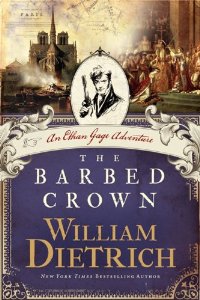 The fluid loyalties during the Napoleonic wars and peaces provide the context. As an American Ethan is sometimes welcomed by either agents of France or Britain or both, but only briefly as alliances, wars, peaces come and go. Ethan was there when the Rosetta Stone came to light in Egypt. He found the tree at the centre of the world in the Louisiana Purchase, he triggered a slave rebellion in the Caribbean, he was captured by Barbary pirates…..what a curriculum vitae he has.
The fluid loyalties during the Napoleonic wars and peaces provide the context. As an American Ethan is sometimes welcomed by either agents of France or Britain or both, but only briefly as alliances, wars, peaces come and go. Ethan was there when the Rosetta Stone came to light in Egypt. He found the tree at the centre of the world in the Louisiana Purchase, he triggered a slave rebellion in the Caribbean, he was captured by Barbary pirates…..what a curriculum vitae he has.
Then there is Ethan’s self-deprecating humour. Though he knows himself to be a bumbler extraordinaire his reputation as the James Bond of his time just grows and grows. He knows himself to be a peaceful scientist, though he has been instrumental in the outcome at the Siege of Acre and the Battle of the Trafalgar while trying to get home in time for dinner. He knows himself to be a faithful husband….Can he help it if all the women he encounters are beautiful and throw themselves at him? His wife certainly thinks so and she has had to come and get him out of trouble more than once, cutlass in hand.
The novels are peopled by historical figures like Napoleon, Pitt the Younger, Toussaint Louverture, Horatio Nelson and others. These luminaries, constantly plotting against each other, see in Ethan a catspaw. They lie to him, manipulate him, tempt him and he has little resistance to any of it. Hope ever trumps experience, and Ethan thinks he can outsmart these puppet masters and he is always wrong. Fortunately he never learns and comes back for more in the next novel!
I went through a Napoleon phrase once. Why? I was fascinated by fragmentary accounts I had come across of his ability to multi-task anywhere, to micro-manage from afar, to shift gears in an instant from one problem to another, to size up a man and extract what he needed from him, coupled with the inability to see reality (think Russia or the catastrophic naval exercise at Boulogne), all of these made me wonder how he did it. I was also fascinated to see the practical improvements at Versailles to make work more efficient, e.g., a table in the bath, seats for secretaries to take notes while he performed ‘the essential tasks,’ as Aristotle called them. (Figure it out.) I read three biographies, all of them weighty tomes. I cannot list the titles because I did not find answers in any of them so there were no notes. Here he is again in these books, dominating much of the world.
NB there is a reference to Machiavelli on p124 ‘Napoleon was building a clan worthy of Machiavelli.’ (Huh?)
I do hope Ethan Gage does not yet retire, as he often dreams of doing, because he has not yet visited his particular brand of mayhem on India. There another whole continent awaits him! I thought this one to be a return to top form, as I found the last one in the Caribbean a little forced. This one meets the rollick standard.
After the steeped sorrow of Carson McCullers, Ethan Gage is a welcome change of pace.
Nicholas Hasluck, The Dismissal (2011)
The long fallout from youthful idealism and the intoxication of creating a brave new world, Prospero, in the United Nations. Recommended for anyone who remembers 11 November 1975.
‘Long fallout’ is a geologist’s term for the run of material in a seismic shift miles from the fault where the fracture occurred. If I remember it rightly from Wallace Stegner’s novel Angle of Repose (1971). Freya, Simon, and Roy are the protagonists, centring on Roy through whose eyes we see most of it. By the end Roy’s sister Alison, it turns out, was also a more of a player than Roy realized. Oops, that is a spoiler, I guess.
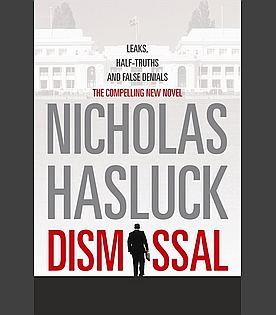
They were motivated by causes in the 1930s and carried those goals into government service during World War II. They had met many True Believers, including Roy’s sister, fellow travellers, dilettantes, voyeurs, and Stalinists. At Oxford they individually had brushed against Left Champions like the Red Peer (who is Erridge in The Dance to the Music of Time). At times they do favours for each other or for friends of friends involving confidential information. At the San Francisco conference founding the United Nations Roy met Alger Hiss. Because of this meeting he is forever slightly suspect. Yet Roy is in but not of this coterie, always a little aloof and withdrawn.
Of course the title refers to the dismissal of the Whitlam government on 11 November 1975 and the lead up to that event provides the context for the reckoning among the three. Will their respective pasts catchup to one or all three of them? What is it that is in the past of each anyway? Should they stick together or seal themselves off from one another?
They had earlier weathered the Petrov Royal Commission with Roy singled out for doubt, though nothing more. He lived it down at the Sydney Bar in the following years. He became a legal consultant to the Whitlam government and like everyone else is caught in the tsunami of the Loans Affair (which seemed then and seems now like something from a Marx Brother movie). If Roy’s past is remembered will it sink the already sinking government? The captain and crew are the only ones who do not realise the boat is already sunk, as they row furiously on. Not sinking, sunk.
The telling is paced and methodical. The pieces slowly come together. The treatment of the many characters from Gough Whitlam, Malcolm Fraser, Garfield Barwick, John Kerr, to Doc Evatt is even-handed. Some pseudonyms are used and it is fun speculating on who these creations represent. I thought Dusty was a slice of Alan Ramsay, not the whole man at the time but an aspect of his earlier self.
There are nice details like the furnishings of Yarralumla, and its origins, a state visit by Vice-President Spiro Agnew, the fishbowl of official Canberra. The formality of Canberra at the time seems a long time ago, seating by status even on a minibus to the airport, an entourage of eight for the Governor-General to go to Sydney for a private visit, etc. all that seems almost foreign, something from another country, not simply another time.
The novel closes with the frenetic effort to find a parliamentary and constitutional means to save the Whitlam government, as if a form of words, or application of an arcane parliamentary maneuver would have stayed the doom. A delay might have held off the doom a few more days but nothing more, but the stalwarts clutch at the straw that public opinion will change.
In 1950s Canberra Roy and company would have come across Edith Berry from Grand Hotel, Dark Palace, and Cold Light. She is a more fully developed character than anyone in these pages. The prose is…workman like. More like a brief that uses some fictional devices to lay out the material than a novel where we enter another world as seen by someone else.
Speaking of connections, Roy’s wife, Judith, is the daughter of the architect of the amphitheatre at Castlecrag. Roy and Judith met at amateur theatrics there. Judith is merely a plot device, apart from that intriguing reference.
This counts as another Perth book because the author lives in Perth, but nothing in the book relates in any way to West Australia except some mentions once or twice of offshore islands considered for nuclear tests.
I have read several of his other novels, Quarantine, The Blue Guitar, Bellarmine Jug, Truant State, The Country without Music, and The Blosseville File. I was once on an APSA panel with Nicholas Hasluck and had lunch with him a few months later on Perth with his father who figures briefly in this book.
Read it in Darwin, August 2013.
Murray Bail, Homesickness (1980)
Only recommended for travellers who haunt museums and galleries. I read it because I liked Eucalyptus so much.
Inventive for the sake of being inventive. A show-off adolescent kind of clever. More a series of (forced) vignettes than a novel. There is no red line tying all the incidents together. Incoherent, in short, with more than one non sequitur.

Travel and traveling companions. What did Sartre say about other people? He must have met Garry Atlas of this book, loud, leering, and humourless joke-teller. Travel is enough work on its own but in this package tour the thirteen Aussies are always on duty. Noisy, sneering, crude, insensitive, imperceptive, well some of them. Nothing is as good as home, they bellow. They had to leave home to discover that, it seems, especially the beer.
The blind man is the mad photographer though his pictures seldom include the subject. The author is trying too hard to be offbeat.
Yet there is much to like: holographic equations from the science museum and the corrugated iron collection exhibiting its many uses. Then there is the leg museum in Ecuador. The marriage institute in the United States. I left out the Pygmy Collection in Africa. Yes, ‘Collection’ and that confused the travellers, too. ‘Have you ever met an interesting Canadian?’ That is a stumper on page 298. The Ayers Rock nose show, the aside on aerogrammes, the exhibition of extremities, the superfluous chapter on Russia, the centre of gravity, it just got to be show-off stuff, not a story, not a plot, not character development, not a study of relationships. Though I did like the demonstration at Lenin’s tomb, I admit, Comrade.
The reference to airport architecture as Esperanto was good. The same everywhere and soulless. The flag falling onto one of the travellers was cute. Voss is mentioned as if a real explorer along with Leichhardt, Flinders, Cook, etc. I read that one years ago and swore off the sanctimonious Patrick White forever, filing him with Samuel Marsden.
Not as whimsical and enchanting as Eucalyptus but the same motif, a cast of characters with short stories inserted in it making it a novel comprised of short stories or vignettes.
Inventive, yes, but no plot, no story, no character development, no relationship among them. And no sense of place in any of the places. Still a prize winning novel that made his name. Go figure.
The introduction by Peter Conrad is just a summary.
Read it in Darwin, August 2013.
Cloudstreet by Tim Winton
Cloudstreet (1991) by Tim Winton.
Exhilarating, depressing, amusing, frightening, confusing, boring, exciting, just like life. Recommended for adults. If you liked Iron Man III, do not read this novel.
The novel is a ramshackle chronicle of two families, the Pickleses and the Lambs. By twists and turns they come to share a house owned by the luckless and penniless Sam Pickles. Over more than twenty years at 1 Cloud Street the two clans together become a tribe through many trials and tribulations. Sam supports the bookies and his sodden wife Dolly likes men with pants. Their daughter, Rose, the oldest of three children, hates her mother a little more than her father (a deliberate ambiguity). Brothers Ted and Chub are, be it said, no more than ciphers. Oriel Lamb has the drive of a sergeant-major and her husband Lester was trained by the army in two wars to obey. Their children are Quick, Fish, Lon, Hat, Elaine, and Red. The first three are boys and the last girls, these being family nicknames.

From 1945 to 1965 they bounce off each other, spin out of control, try out the temptations of Perth, hate and love one another, punctuated by long periods of mutual indifference.
The Monster of Nedlands appears to remind us all how vulnerable the gravity is that holds us to this life. He also figures in Robert Drewe’s Shark Net (2000). There is a pig who seems a relative of the one in In the Winter Dark by Winton.
The Lambs are noisy Baptists and the Pickleses are … Nothing much. But Sam Pickles needs the rent and Lester Lamb needs the roof so they accommodate each other. Over the years an elastic modus vivendi keeps them in orbit around each other.
Sam waits for his luck to change while doing as little as possible, apart from blaming everyone else for making him a victim. Oriel does too much, too often, and makes her own luck with the loyal Lester at her side, when he is not in the kitchen turning our pastries and pies for the shop. That is the overarching theme, these two attitudes to life: the fatalism of luck or the energy of work.
The story line is the gradual convergence of Rose and Quick. Oops, that is a spoiler. He is called Quick in the way a giant is called Tiny. Rose reads books, including novels like Jane Eyre. Moreover, she is diabolically smart though needs must and she leaves school at the legal age of 16.
I did not know what to make of Quick’s wall of misery, newspaper cuttings of loss and destruction he cut out and stuck on the wall in his room when he was 14 or so. Still less did I know what to make of Quick’s guardian angel, the aboriginal, who several times advises him, and appears at least once to another. More importantly, I did not know what to make of the house-mysticism in the book. It is often implied that the house itself has character or an aura but it is not manifested in the prose.
Some things are elided to concentrate on the story, like the paper work associated with running a small business.
I have read a couple of Winton’s books before and liked them, e.g., In the Winter Dark and The Riders.
One of the blurb writers on the back cover says it is a working class novel. Well that is Sam Pickles but not the shop keeping Lambs, surely. As usual the bourgeoisie does not understand what working class means, never having done it themselves. It does not mean owning and running a shop (Lamb), or living off the rental of property (Pickles).
I read this in anticipation of going to a conference in Perth in September. I have several more Perth titles in readiness.
Read it in Darwin, August 2013.
